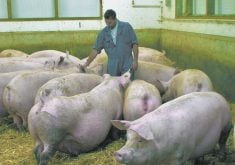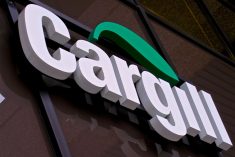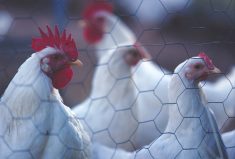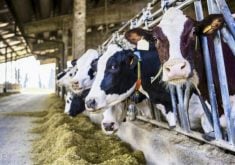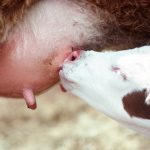Backlogs on ear-tag orders have left some cattle producers with an ear to the ground, listening for distributors that have a supply.
The Canadian Cattle Identification Agency (CCIA) was alerted that a few approved RFID tag manufacturers had supply chain and labour issues that slowed production.
“(The CCIA) has been keeping a close track of what tags are out there, so there isn’t per se a shortage of tags,” said Pat Hayes, producer and CCIA chair. “We wanted to get the word out there so people didn’t wait till the last minute.”
Read Also

Jennifer Hayes appointed for second term as the Chairperson of the Canadian Dairy Commission
Jennifer Hayes has been re-appointed as Chairperson of the Canadian Dairy Commission by Heath MacDonald, Minister of Agriculture and Agri-Food.
The CCIA has 640 dealers Canada-wide and as of March 18 there were 954,000 tags distributed among them, but it may take producers a couple of stops to find the number and style of tags they prefer.
The call to order early resulted in some authorized dealers placing large orders and attempting to corner the market, said Hayes.
“We as a board of the CCIA represent the producers, and we didn’t want that scenario to come to light,” he said, adding they instituted a weekly ordering cap to ensure even distribution of supplies to avoid monopolies.
The CCIA spoke with the five tag manufacturers and discussed the weekly volume required to stave off a tag shortage.
“They’re not coming in at the same rate from the manufacturers as they normally do,” Hayes said. “(But) they’ve been keeping up with (the requested weekly volume).”
Producers struggling to locate tags can get a list of local dealers with inventory by calling the CCIA.
“We have good inventory out there. It might not be the tag you normally use, so you would have to get a different applicator if you went to a different style.”
Some breed associations are frustrated that breed-specific tags are tough to source, but manufacturers have to reset the system to produce those, he said.
“If they have to change anything in their system, it costs them time. So, you’re not putting out as many tags,” Hayes said.
Allflex produces Angus tags so an Angus producer might need to use a standard yellow tag this year.
“We also want to reaffirm to producers that this is a regulated tag. You have to put it in. It’s law in our country,” Hayes said. “We are staying on top of it and rectifying anyone who can’t get what they want and supplying them with a different style.”
With many options for obtaining tags, producers have no excuse for not finding one, said Hayes.
Don Hargrave, Beef Farmers of Ontario director, said there are approximately 103,000 tags available provincially.
“Even then, you might not get the variety, the company, that you’re used to getting, and you may have to purchase the new applicator for them,” said Hargrave. “But I think the tag prices are relatively the same.”
While he said the shortage hiccup would rectify shortly, producers should adjust their ordering habits to anticipate longer-than-normal queues.
“Order what you need. Don’t over-supply because the supply will get corrected,” he said.
Linda Markle, Holstein Canada’s herdbook and genotyping services manager, said the association addressed the approximate eight-week wait time for ear tags via a producer update in April.
“DairyTrace recognizes two distributors for dairy tags as well as accessories such as applicators. Orders can be placed from the designated providers by location,” said Markle in an email.
“For all provinces outside Quebec, dairy tags can be purchased from DairyTrace via Holstein Canada web account or DairyTrace Customer Service representatives and in Quebec from Attestra.”
Those who urgently require tags can contact DairyTrace customer service at 1-866-55-TRACE (8-7223) or email [email protected] to fast-track the order.
Hayes said that, as a producer-driven entity, the CCIA strives to build a robust and accurate system of tag dispersal to ensure no information falls through the trace-back cracks, especially in the case of a foreign disease outbreak.
In mid-July, the CCIA plans to launch a Calgary distribution centre for Canadian tags.
“We’ll be doing our own distribution out of our warehouse,” he said. “Most (tags) will be sent out by mail as they are now, or by couriers.”
There will still be local dealerships where producers can buy tags off the shelf.
Hayes said the CCIA has been working to address tag loss and deterioration, which occurs when the plastic brace breaks or falls off. None of the options had passed stringent regulations until recently.
“We have a new tag that came on this last year. It’s a steel tag with an RFID indicator on it,” he said. “We see it long-term solving a bunch of the issues if producers decided to start using them on their replacement heifers, bulls and cows. If they’re applied right, I don’t see them deteriorating like the present tags.”
The metal Shearwell tag is more expensive than plastic tags but Hayes said the return on investment in longevity outweighs the extra cost. The tags are available for order through the CCIA website.





